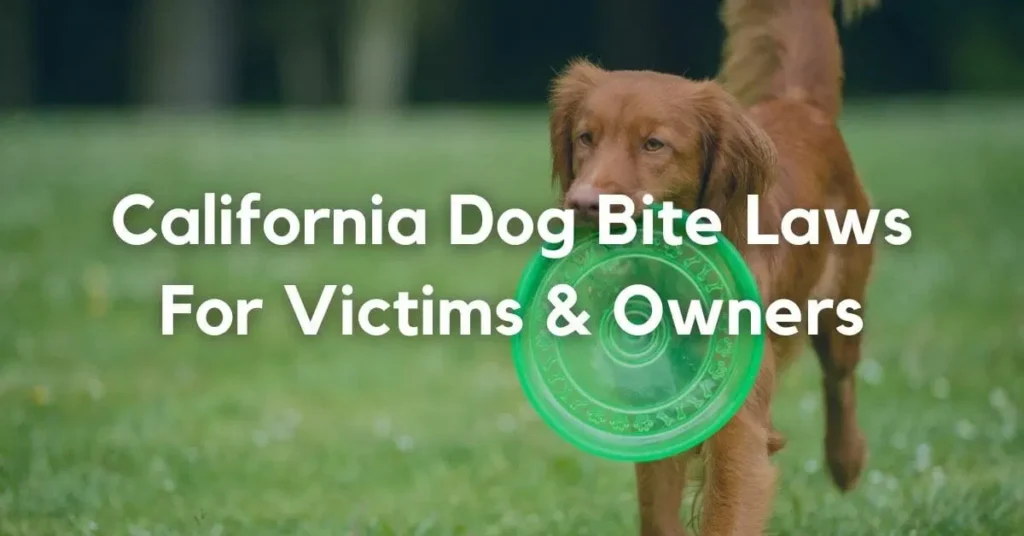
California Dog Bite Laws For Victims & Owners to Understand
Legally reviewed by: Jessica Anvar Stotz, JD, MBA
Who is responsible after a dog bite incident? In California, the owner of a dog is responsible for the damages caused by a dog bite, even if the bite happened in a public place or on the owner’s property.
This is true even if the dog has been aggressive in the past or if the owner knew the dog was aggressive. In this article, we break down what you should know about California dog bite law.
California Dog Bite Laws for Victims to Understand
Here is a brief overview of California dog bite laws and relevant legislation that victims should understand:
| Law | Summary |
| Strict Liability (CC 3342) | Dog owners are strictly liable for their dog’s bites, regardless of the dog’s previous behavior or owner’s knowledge. |
| Compensation for Damages | Victims can seek compensation for damages caused by a dog bite, and owners are held liable for these damages. |
| No Requirement for Previous Viciousness | Unlike some states, previous viciousness of the dog is not required to hold the owner liable for a dog bite injury. |
| Dog Bite Statute (Civ. Code, § 3342) | This statute establishes the owner’s liability for dog bites and exceptions. Victims can seek damages for injuries caused by a dog bite. |
This table provides a concise overview and is not a substitute for legal advice. Consult a lawyer for guidance tailored to your situation.
California Dog Bite Laws for Owners to Understand
Here is a summary of key California dog bite laws that owners should review:
| Law | Summary |
| Strict Liability (CC 3342) | Owners are strictly liable for dog bite injuries occurring in public places or where victims are lawfully present on private property. |
| Reporting (Penal Code 398) | Owners must provide contact and rabies vaccination information within 48 hours of a dog bite. Failure to do so can lead to penalties. |
| Criminal Charges (Penal Code) | Owners may face criminal charges if their dog injures someone while roaming at large, and the owner knew the dog was prone to mischievous behavior. |
| Defenses and Comparative Negligence | Owners may use legal defenses such as victim trespassing or comparative negligence to reduce liability in dog bite cases. |
This table provides a concise overview and is not a substitute for legal advice. Consult a lawyer for guidance tailored to your situation.
Do You Have a Case?
If you were bitten by a dog in California, you can use our online claim estimator to see what your case could be worth in just 90 seconds.
How Liability Works in CA
In California, dog bite liability is based on strict liability rules. This means that dog owners are held accountable for all bites that occur on public property or when a victim is lawfully on private property, regardless of the dog’s prior behavior or the owner’s knowledge. California’s dog bite law is covered under California Civil Code Section 3342, which imposes strict liability on dog owners.
This holds them liable for any damages resulting from a dog bite, even if the dog has never bitten anyone before. The law does not require proof of the dog’s previous viciousness. Additionally, victims do not need to prove negligence on the part of the owner; instead, owners are responsible for the consequences of their dog’s bite. We recommend consulting legal professionals for accurate advice that fits your specific case.

What Can Legally Count as a “Bite” Under California Law
California law defines a “dog bite” as a dog biting a person. Dog owners in California are strictly liable for bite injuries in public or private property where the victim has a legal right to be there. This applies whether the dog has bitten before or the owner knew about its aggression. California law considers a dog bite even if the bite does not break the skin.
Note that the strict responsibility statute applies when the victim is in public or legitimately on private property when the bite occurs. This statute may not cover trespassers. If a dog causes an injury while roaming and the owner knew it was “mischievous” and didn’t control it, criminal penalties may apply.
What Should You Immediately do After a Dog Bite as a Victim
If bitten by a dog, take immediate action by following these steps:
- Clean the Wound: Wash the wound with mild soap and warm water for 5-10 minutes.
- Stop Bleeding: Use a tourniquet or apply a clean cloth with pressure on the injury to slow bleeding.
- Apply Antibiotic Cream: If available, apply over-the-counter antibiotic cream.
- Wrap with Bandage: Cover the wound with a sterile bandage.
- Seek Medical Attention: Regardless of bite severity, consult a doctor or visit urgent care.
- Identify Dog and Owner: Gather dog owner’s contact information and proof of rabies vaccination.
- Observe for Infection: Watch for signs of infection and change the bandage as needed.
Remember to remain calm, remove yourself from the dog’s presence, and attend to the victim’s needs while doing your best to provide hygiene and medical care until emergency services can arrive.
What Should You Immediately do After a Dog Bite as an Owner
As a dog owner, if your dog bites someone, take these immediate steps:
- Secure Your Dog: Safely restrain your dog to prevent further harm.
- Help the Victim: Do your best to ensure their safety.
- Provide Information: Share your contact details and information about your dog’s vaccination status.
- Offer First Aid: Assist the victim in cleaning the wound with soap and water.
- Seek Medical Attention: If the bite is serious, advise seeking medical care promptly.
- Report the Incident: Comply with local regulations and report the bite incident if required.
- Prevent Future Incidents: Take steps to prevent future bites by addressing any behavioral issues.
Be sure to cooperate with the victim and prioritize their well-being after the incident. It is essential not to admit fault, as that can have legal implications. Instead, focus on assisting the victim and taking appropriate steps to ensure everyone’s safety and health.
Dog Bite Defenses for Owners
Common legal defenses for dog owners facing a dog bite lawsuit include:
- Provocation: If the victim provoked the dog or engaged in aggressive behavior.
- Trespassing: If the victim was unlawfully on the property where the bite occurred.
- Lack of Injury: If the victim did not suffer significant harm.
- Assumption of Risk: If the victim knowingly took a risk interacting with the dog.
- Contributory Negligence: If the victim’s actions contributed to the bite incident.
- Lack of Causation: If the owner’s actions did not directly cause the bite.
Consulting with legal counsel familiar with your state’s laws is crucial if you are facing a dog bite lawsuit.
Dog Bite Evidence for Victims to Document
Key evidence for dog bite victims to document includes:
- Photographs: Take pictures of injuries, torn clothing, any property damage, and the dog involved.
- Medical Records: Keep records of medical treatments, bills, and doctor’s reports.
- Witness Statements: Gather contact information and statements from witnesses.
- Dog Owner Information: Record the owner’s name, address, and contact details.
- Dog Details: Note the breed, size, and any previous aggressive behavior of the dog.
- Location: Document where the incident occurred, including any hazardous conditions.
- Reporting: File a dog bite report with Animal Control or local authorities.
- Communication Records: Save texts, emails, or social media posts related to the incident.
This evidence helps support injury claims or lawsuits, demonstrating the dog owner’s negligence or liability
What to Do if Your Dog Was Bitten By Another Dog?
If your dog is bitten by another dog, follow these steps:
- Ensure Safety: Separate the dogs to prevent further aggression.
- Assess Injuries: Check your dog for wounds, wet patches, or signs of pain.
- Administer First Aid: Clean wounds with lukewarm salt water and dress them, seek emergency veterinary care if necessary.
- Collect Information: Exchange contact details and medical information with the other dog’s owner.
- Witness Statements: Gather statements from witnesses if necessary.
- Local Authorities: Depending on local laws, report the incident to animal control or the police.
- Monitor and Seek Veterinary Care: Watch for signs of infection or discomfort and consult a vet if needed.
- Address Triggers: Identify triggers that led to the altercation to prevent future incidents.
Taking immediate action in addressing the situation to ensure your dog’s well-being and compliance with local regulations
Frequently Asked Questions
What if My Child Was Bit?
If your child is bitten by a dog:
- Assess the Injury: Examine the wound’s severity. For severe wounds, seek emergency medical attention.
- Control Bleeding: Minimize bleeding by applying gentle pressure with a clean cloth.
- Clean the Wound: Wash the wound with soap and water to prevent infection.
- Apply Antibiotic Ointment: Apply an over-the-counter antibiotic ointment and cover with a clean bandage.
- Watch for Signs of Infection: Monitor the wound for redness, swelling, or discharge.
- Seek Medical Help: Consult a healthcare professional, especially for deep or infected wounds.
Remember to comfort your child, reassure them, and help them cope with any fear of dogs. If the situation involves your own dog, assess the circumstances and consider consulting experts to address the issue responsibly
Does California Have a One Bite Rule for Dogs?
No, California does not have a One Bite Rule for dogs. Dog owners in California are strictly accountable for dog-related injuries, regardless of the dog’s history of biting or aggression. This differs from the One Bite Rule, wherein some states require a dog owner to know of the dog’s dangerous conduct or previous biting episodes before being held accountable for a bite.
Do You Have to Report a Dog Bite in California?
Yes, California law requires dog bite victims and owners to report the occurrence to their local animal control department within 24 hours. Failure to do so may lead to fines or other legal consequences. Additionally, doctors in California are legally obligated to report dog bites they evaluate or treat, regardless of severity or rabies vaccination status.
What Happens if My Dog Bites Someone in CA?
When a dog bites someone in California, the owner can be held liable for the resulting injuries. Under state law, the owner must give the bite victim their contact information and the dog’s medical history, including immunization records, within 48 hours. To prevent rabies and other infections from the bite, the dog must be isolated for at least ten days. If the dog has bitten several times or is violently aggressive, they may be euthanized.
What is the One Bite Rule in California?
California does not have a One Bite Rule for dog bites. Under the One Bite Rule, a dog owner or keeper is not liable for the first bite or damage caused by their dog. If the dog had previously bitten or showed aggressive behavior, however, the owner may be held liable for any further bites or injuries.
What is the New Dog Law in California?
In 2023, California passed new rules that now require all dogs older than four months to be vaccinated against rabies. Dogs younger than 4 months old must stay at home or be placed on leashes.
Contact an Attorney
At this time, our services are dedicated exclusively to assisting victims of dog bites in California. Owners should seek help from a defense attorney. For dog owners requiring legal guidance, we recommend reaching out to a defense attorney. If you have experienced a dog bite incident and are seeking compensation for your injuries, do not hesitate to contact us immediately.
Our dedicated team is available 24/7 to connect you with some of the most skilled and experienced dog bite attorneys in the state, at no cost or obligation. To learn more about your legal options, contact LawLinq at (855) 997-2558 or visit our website today.


